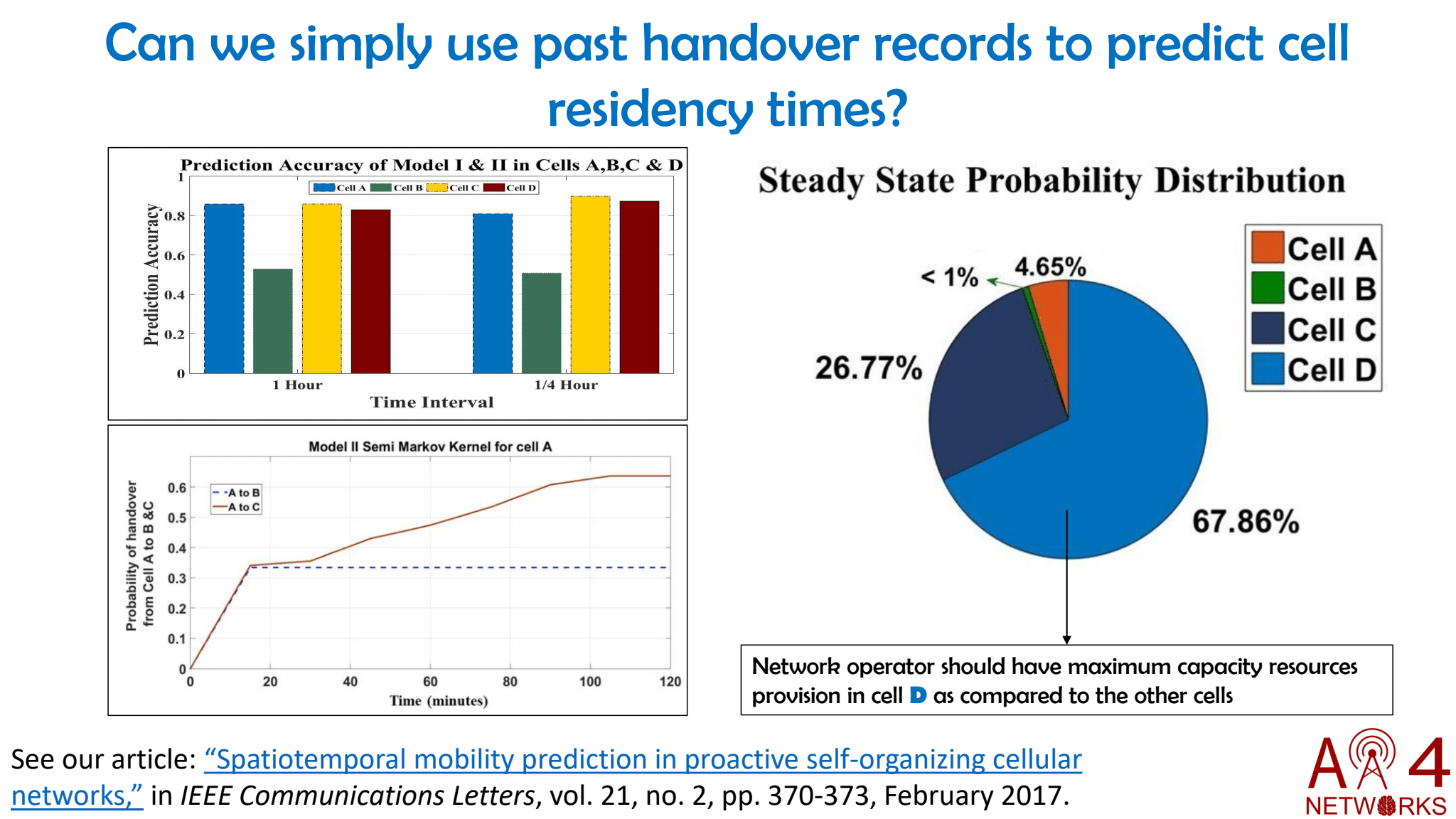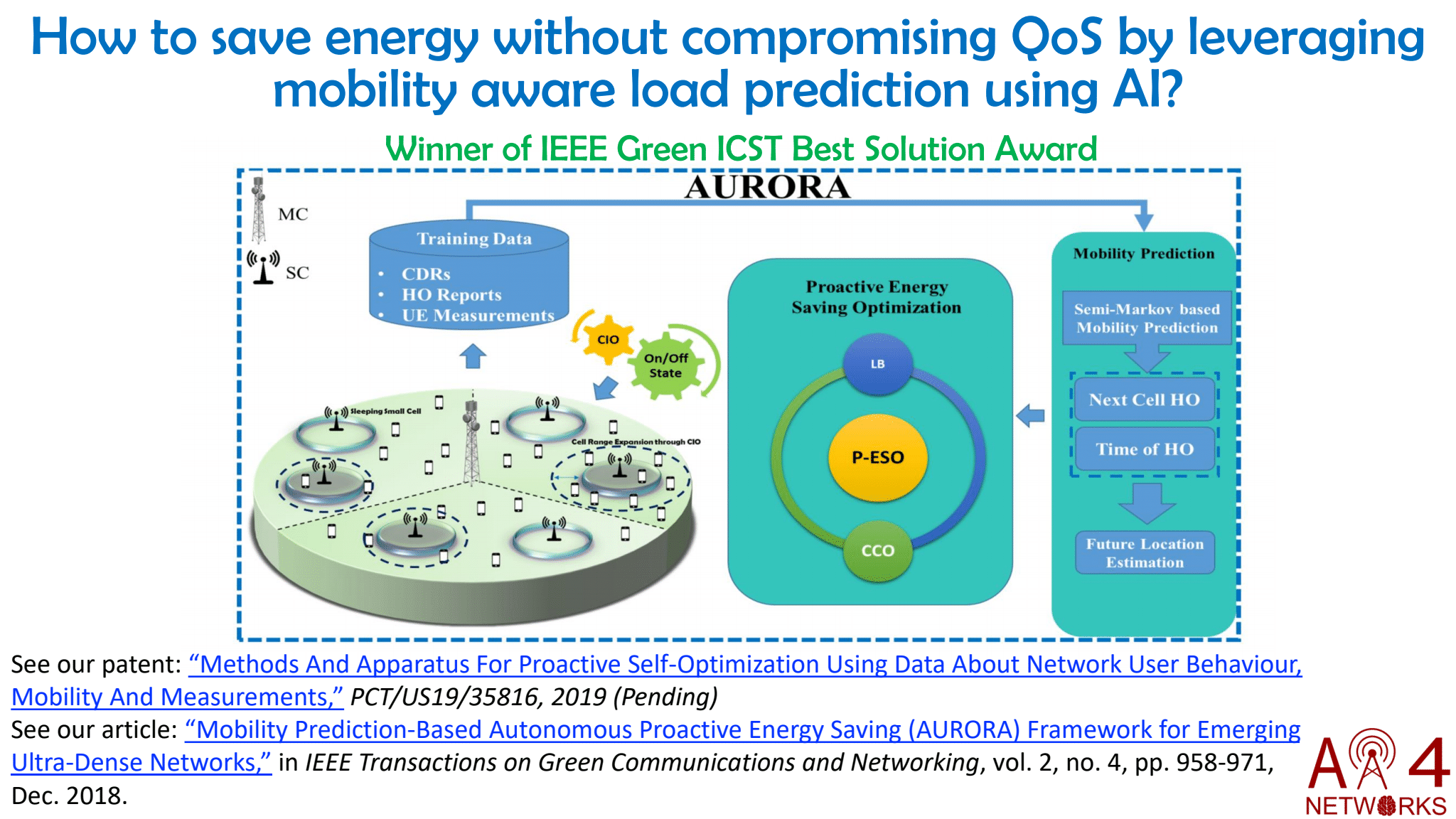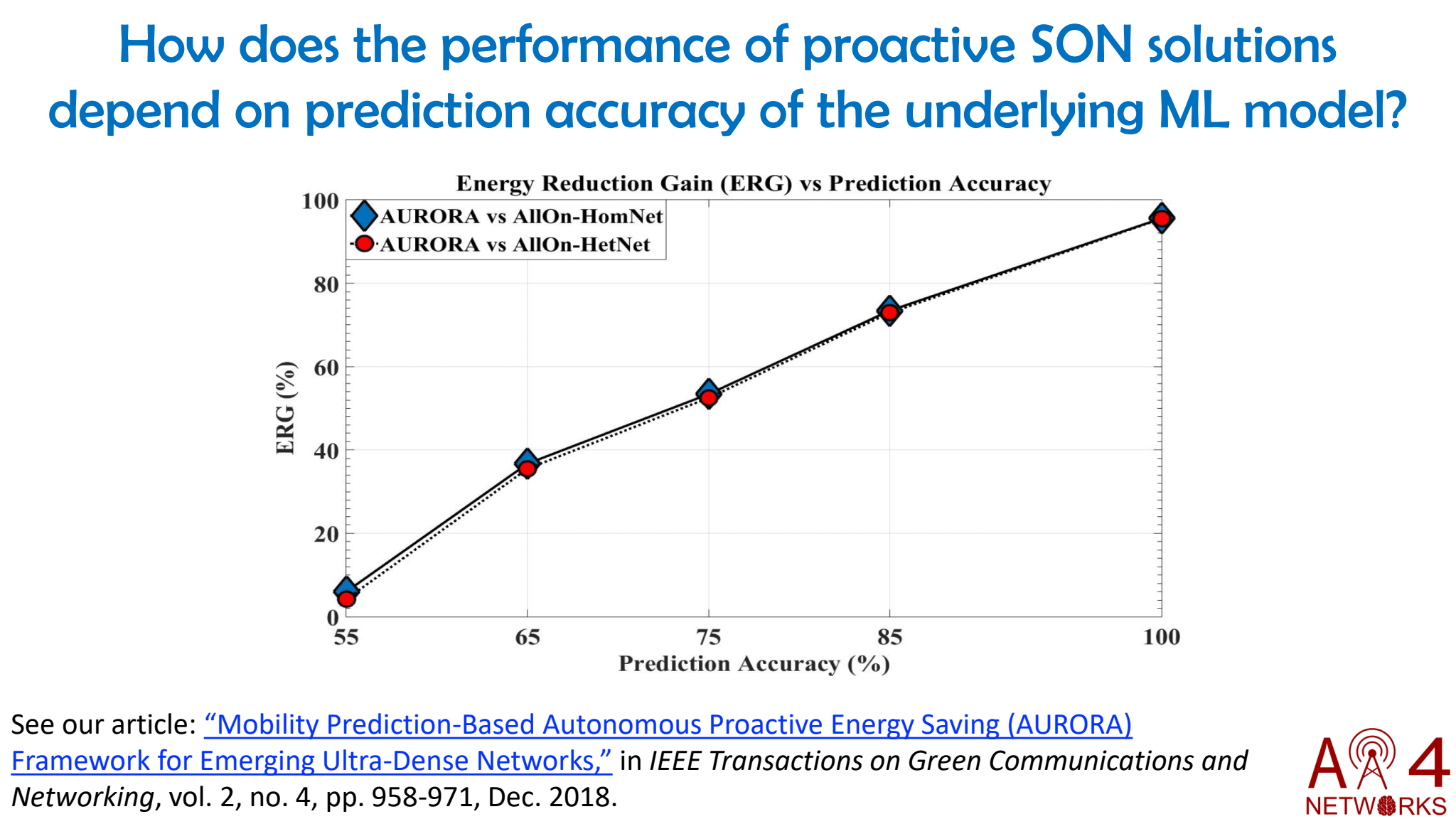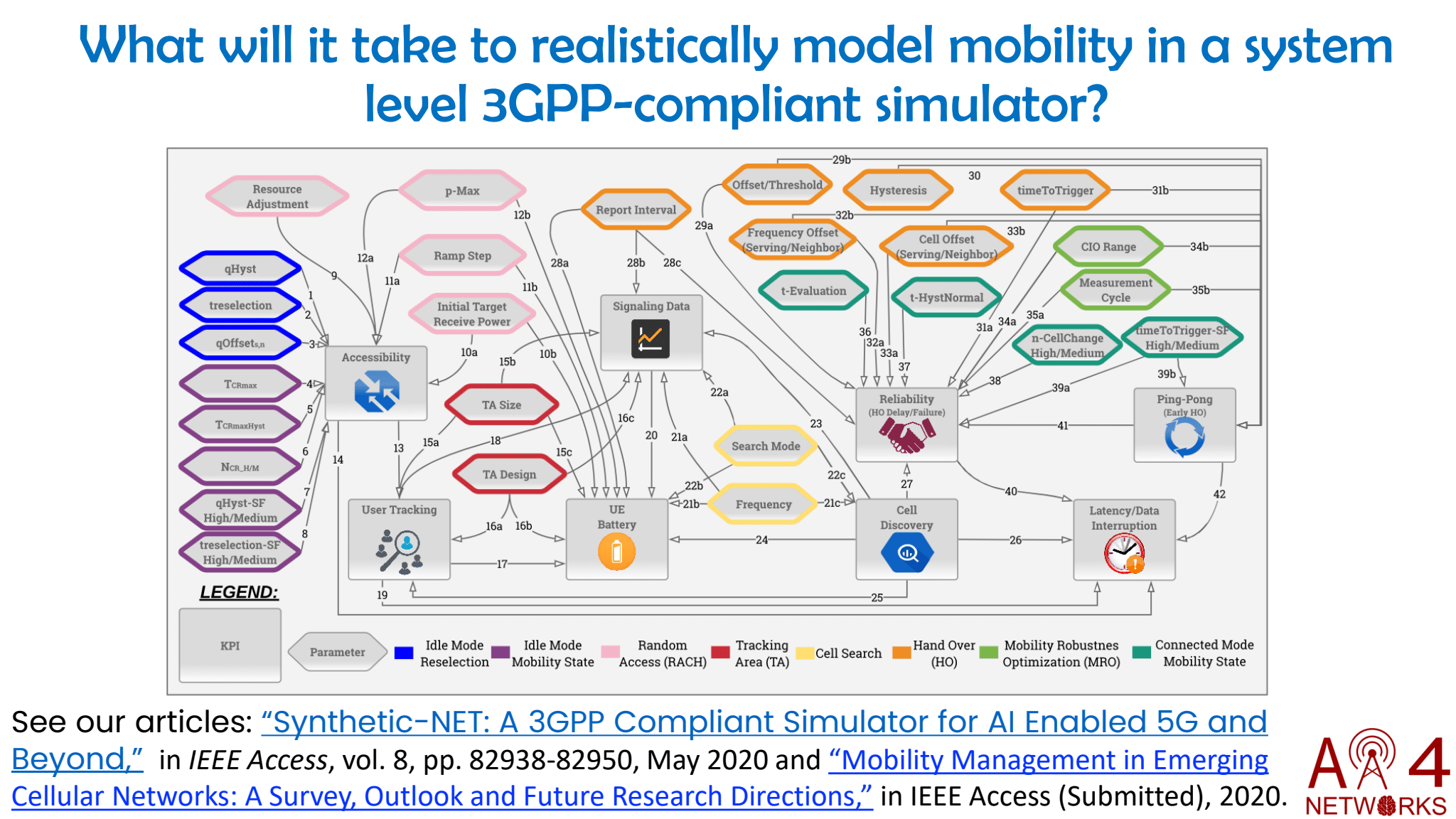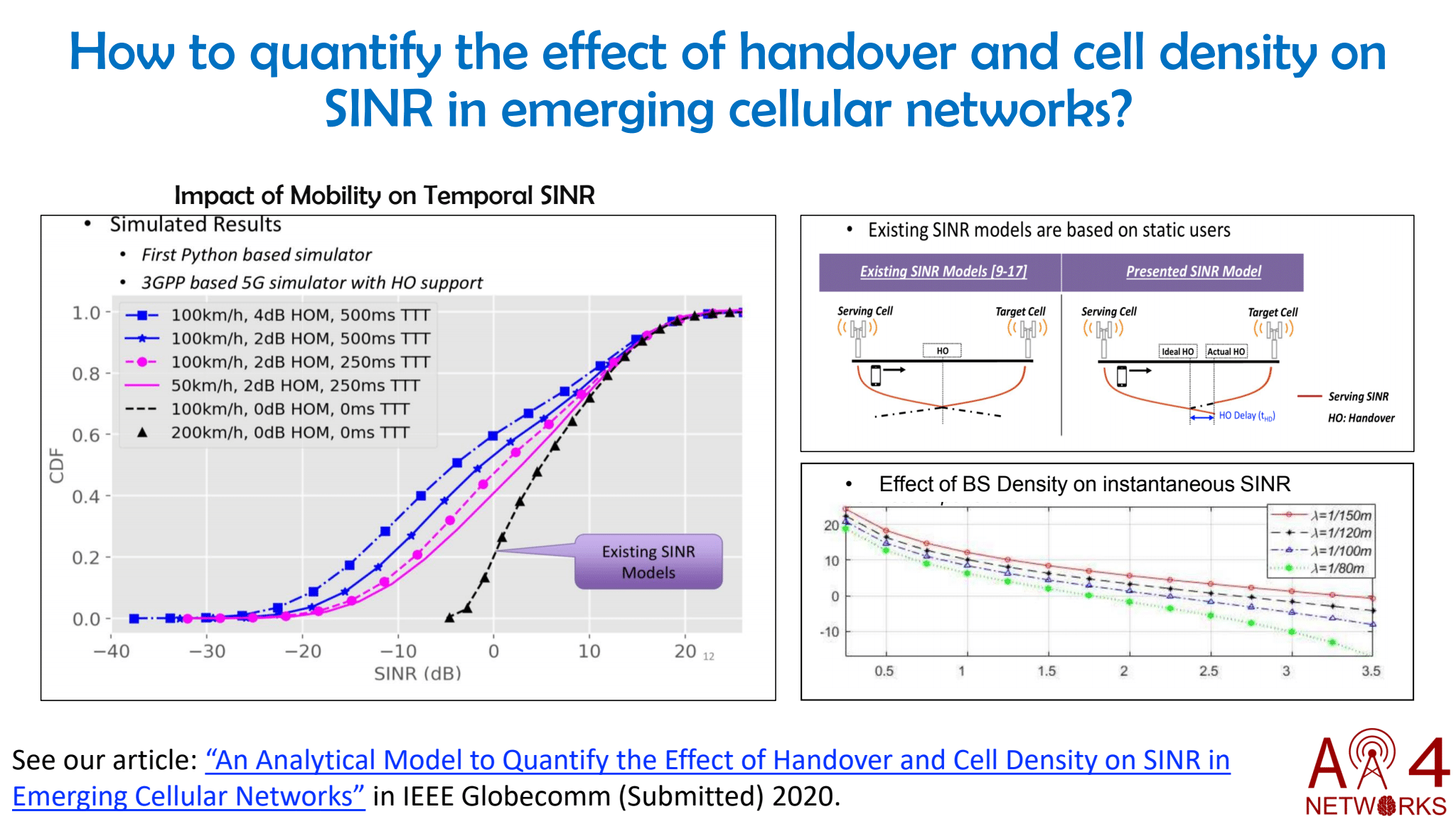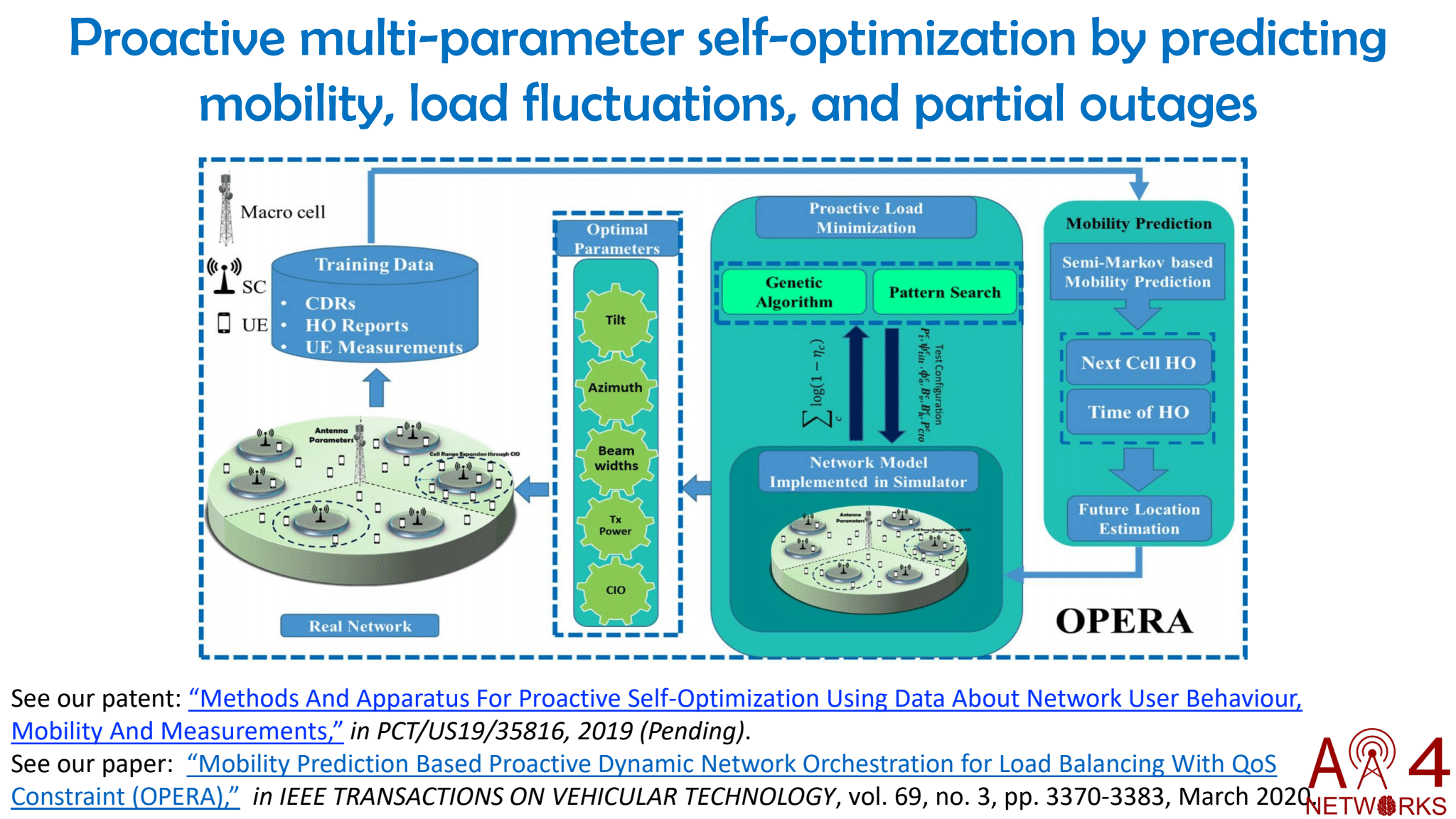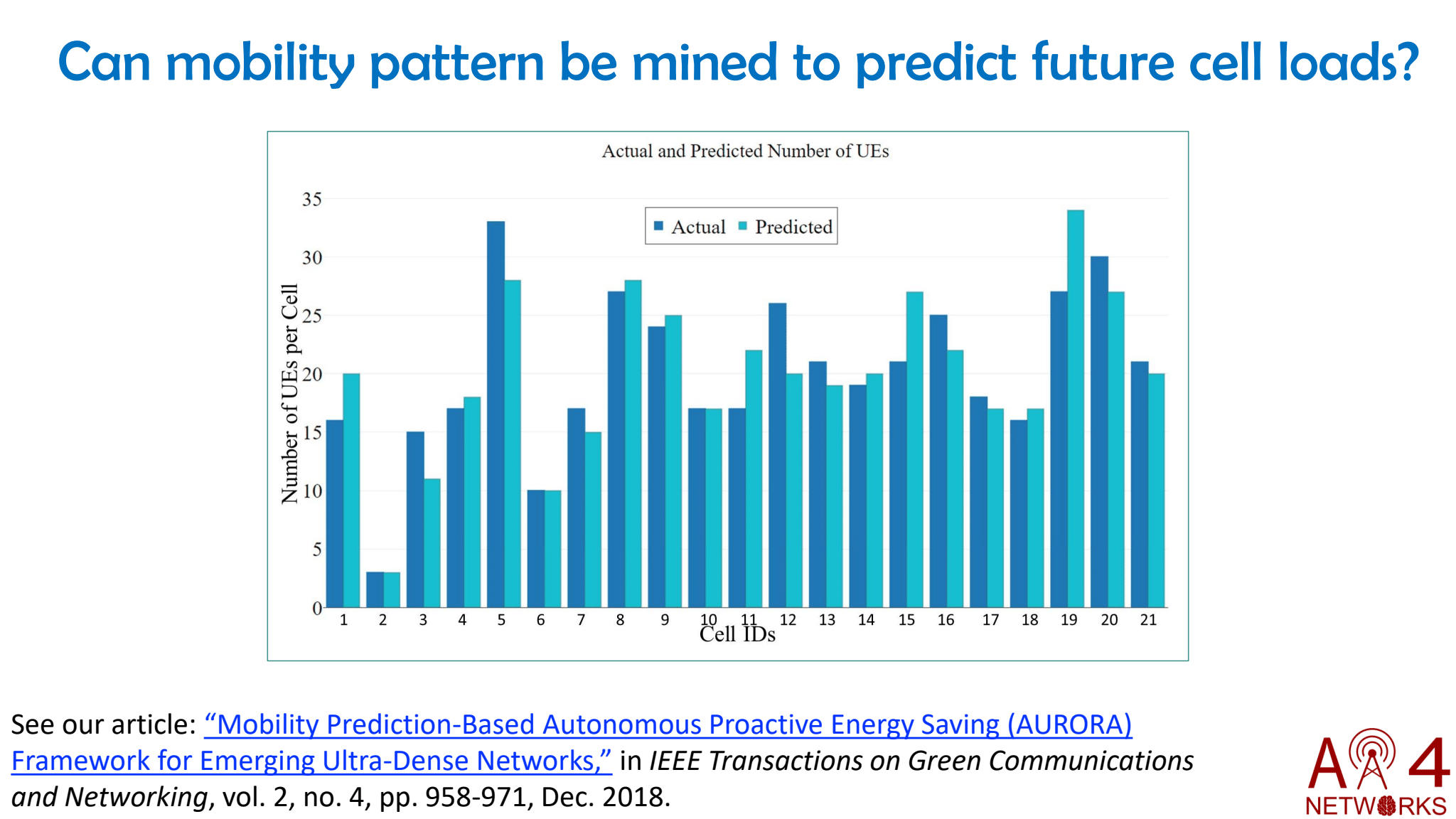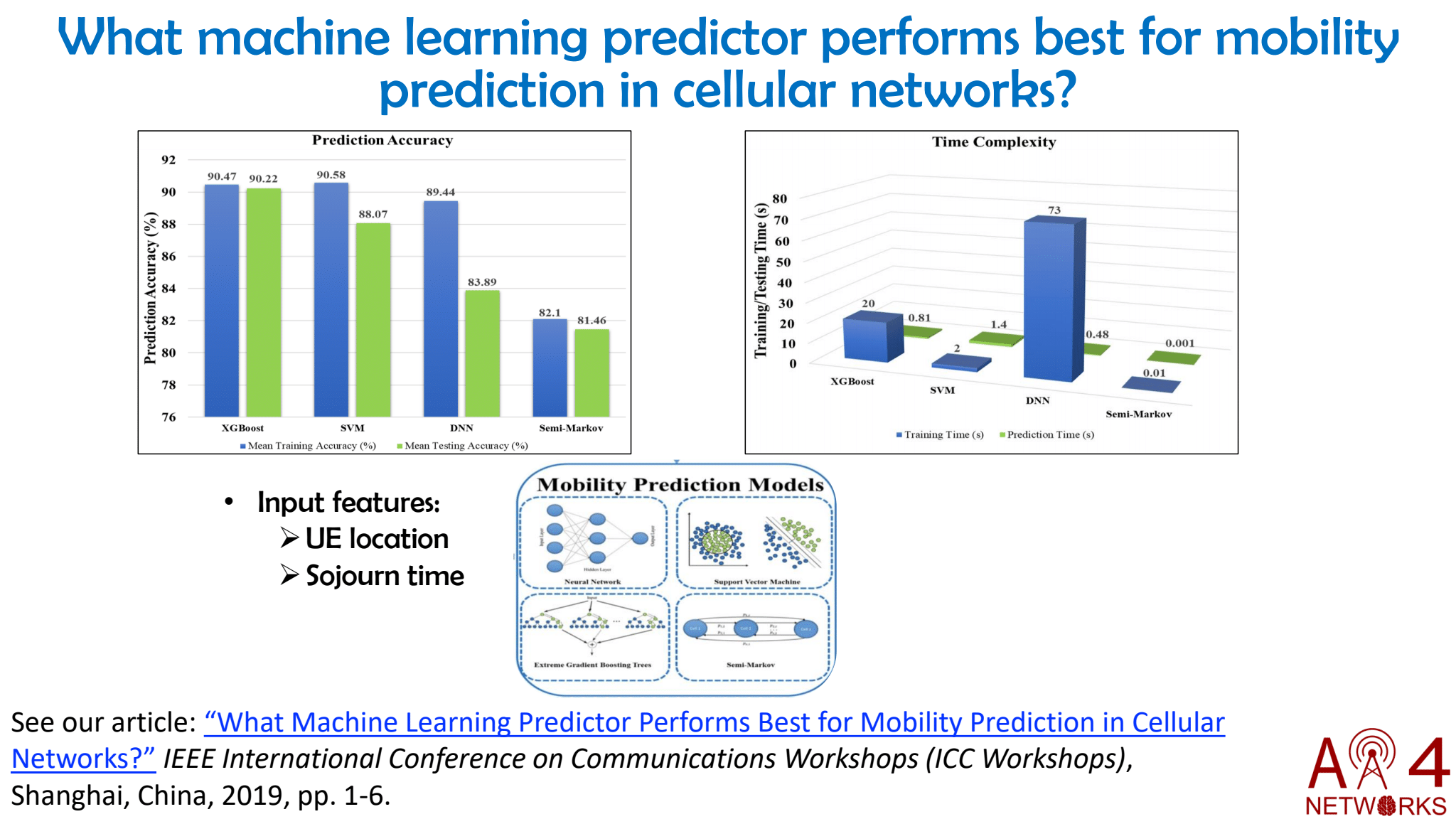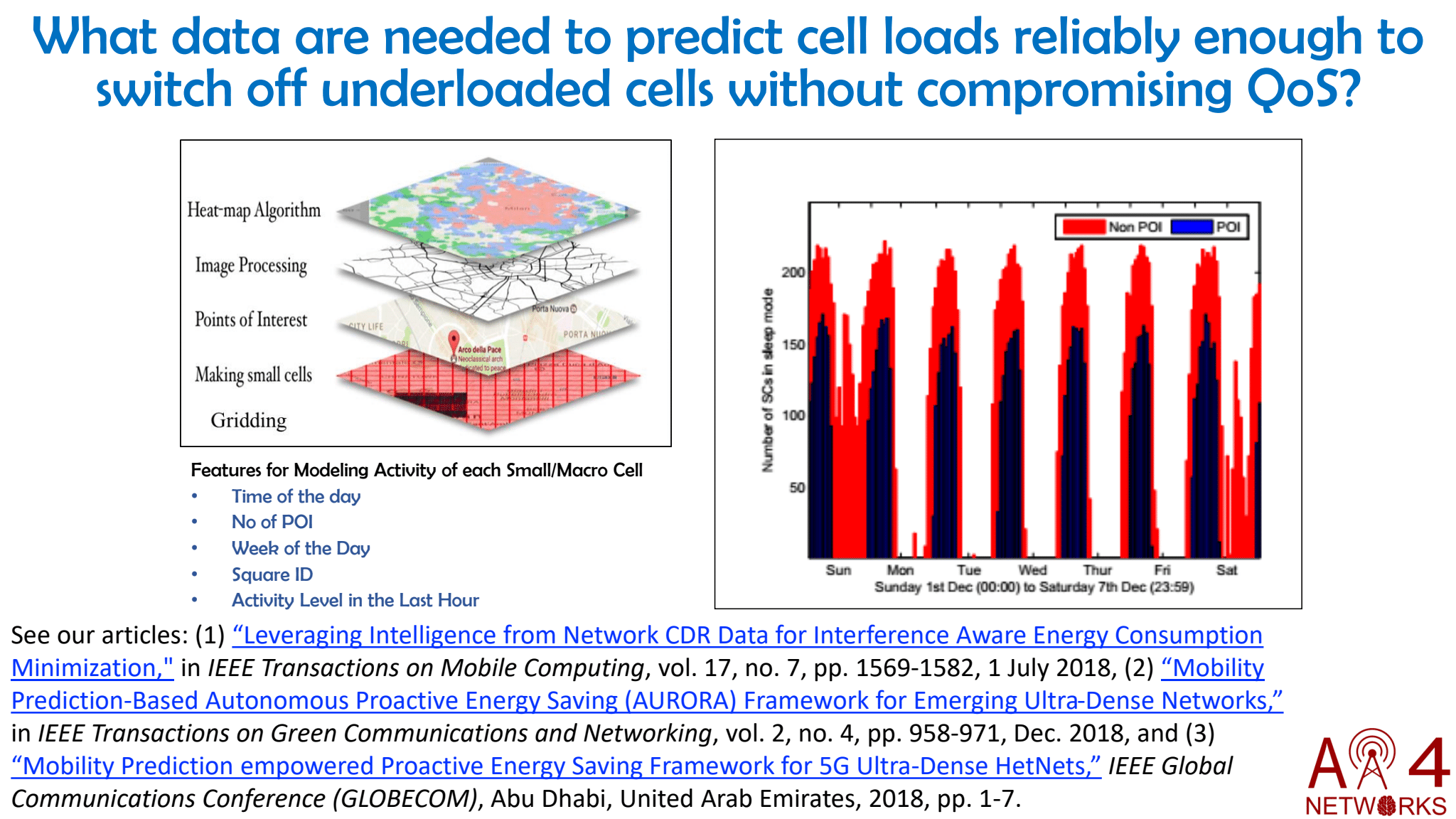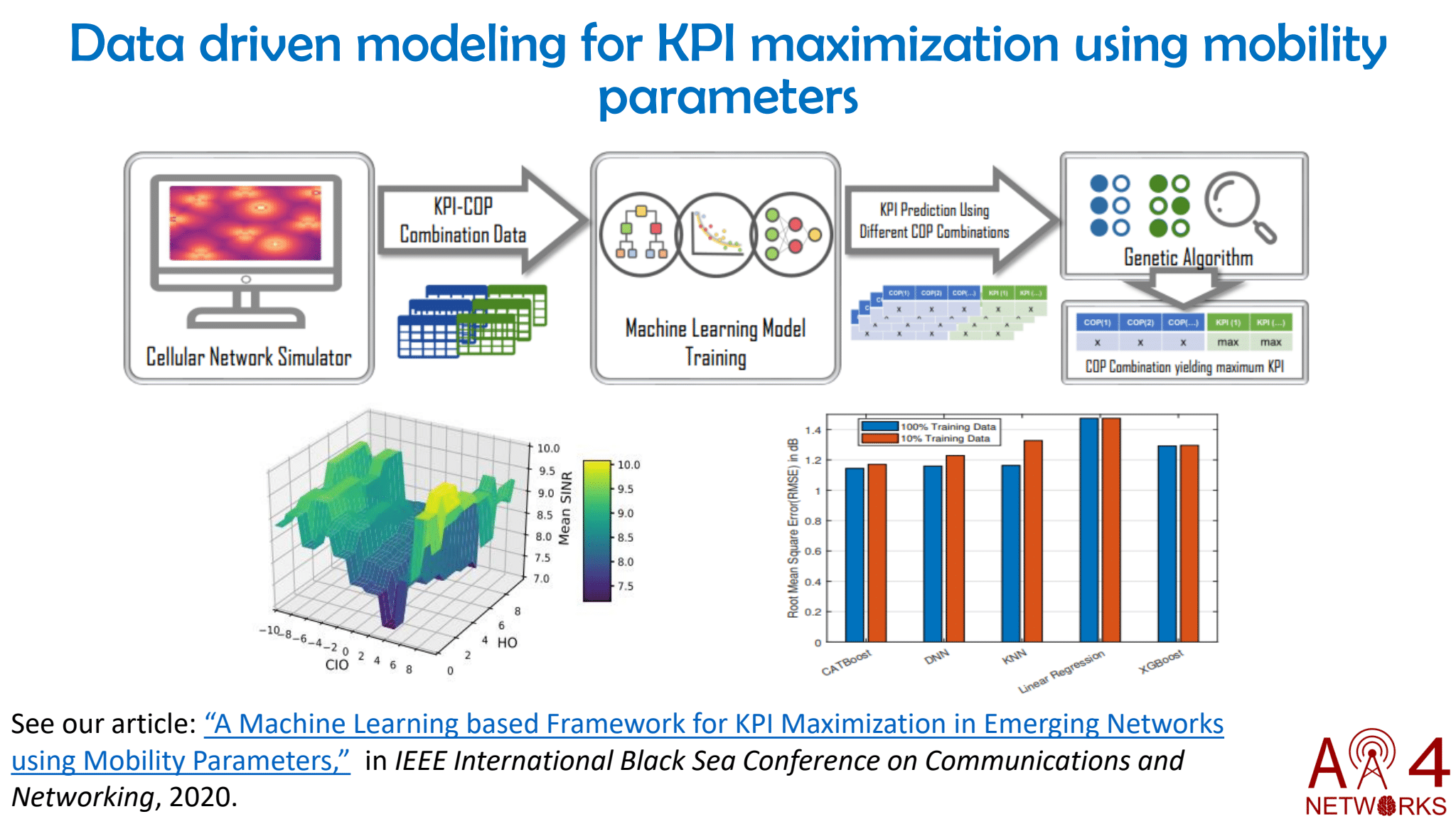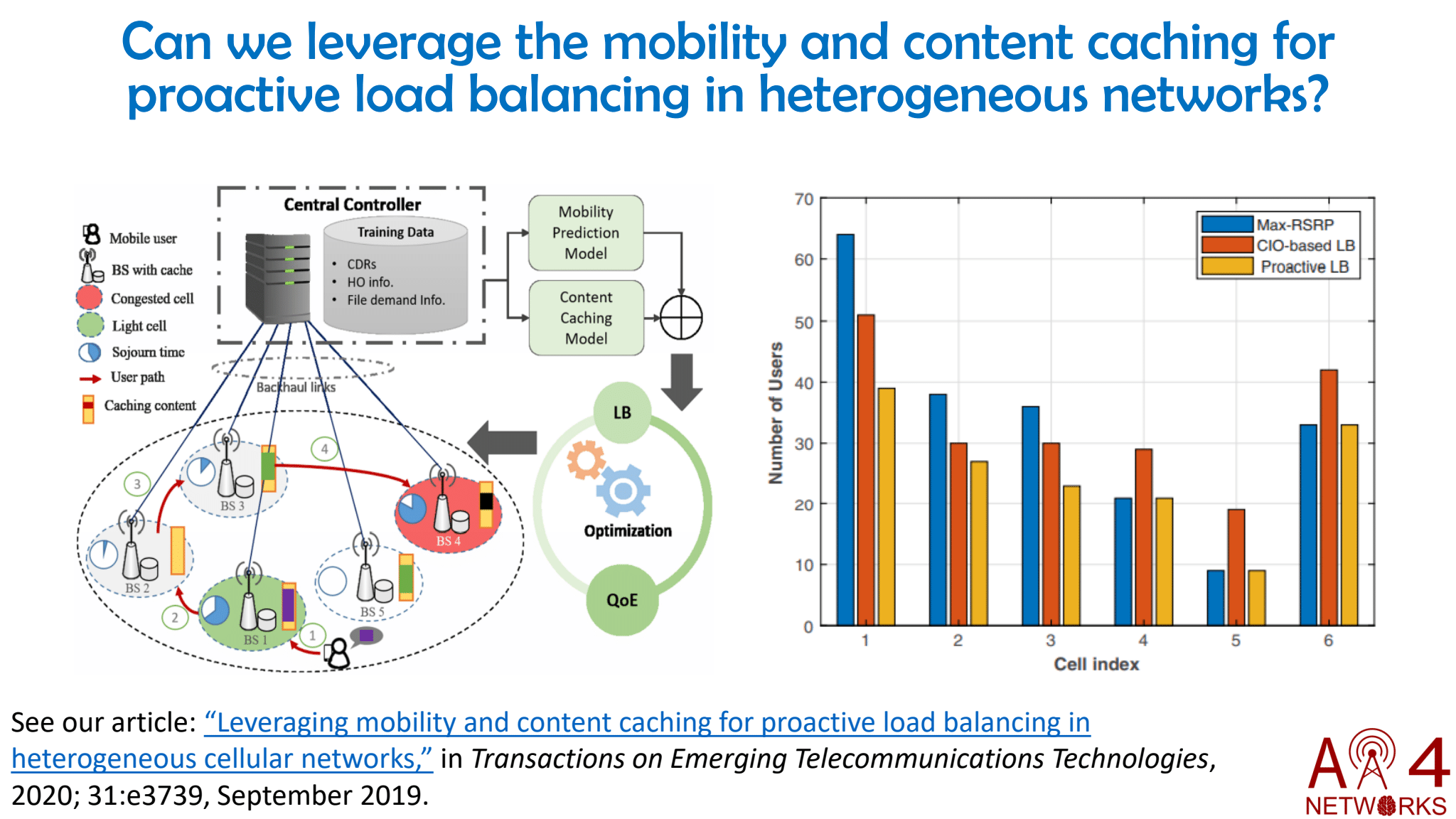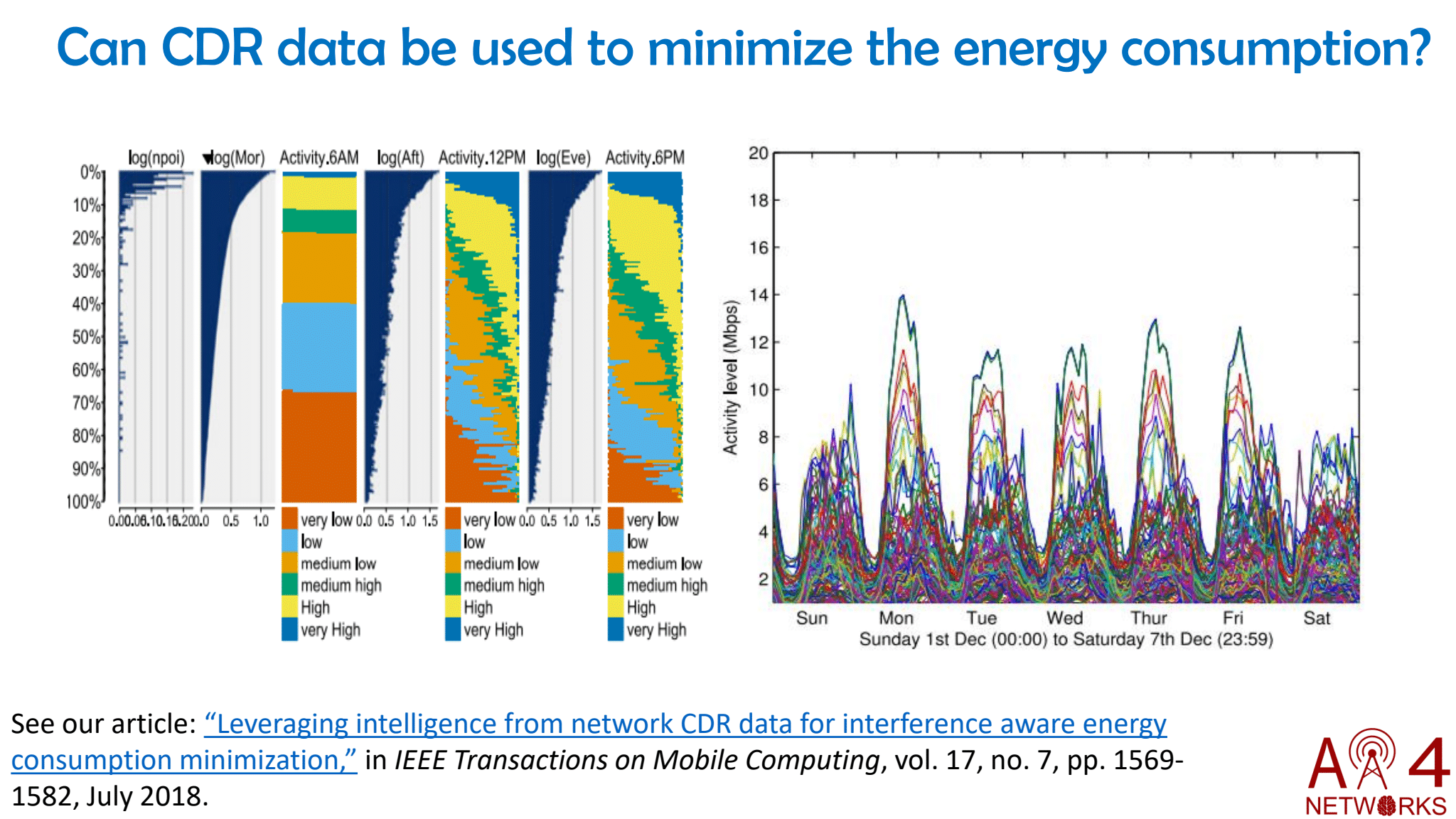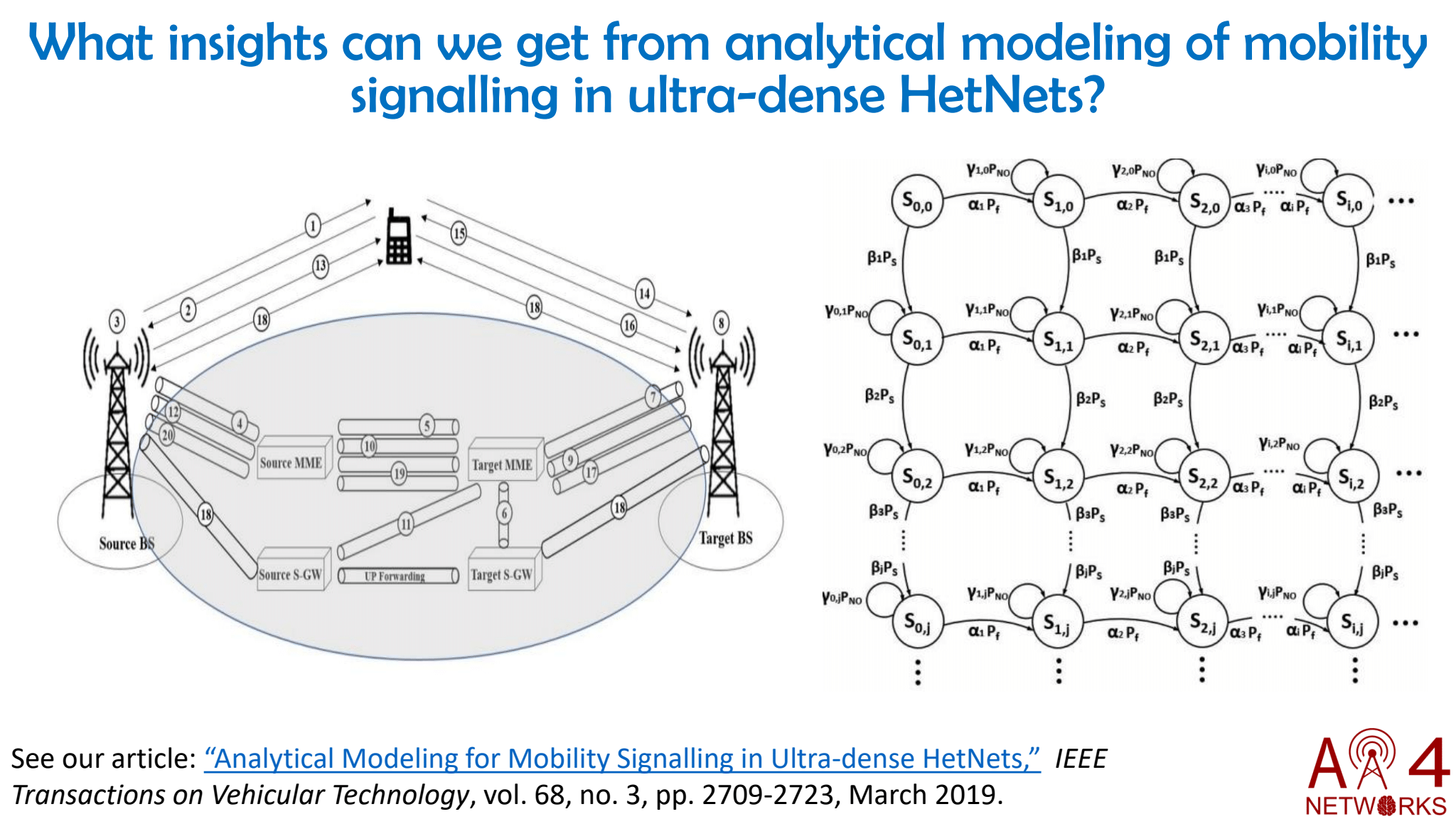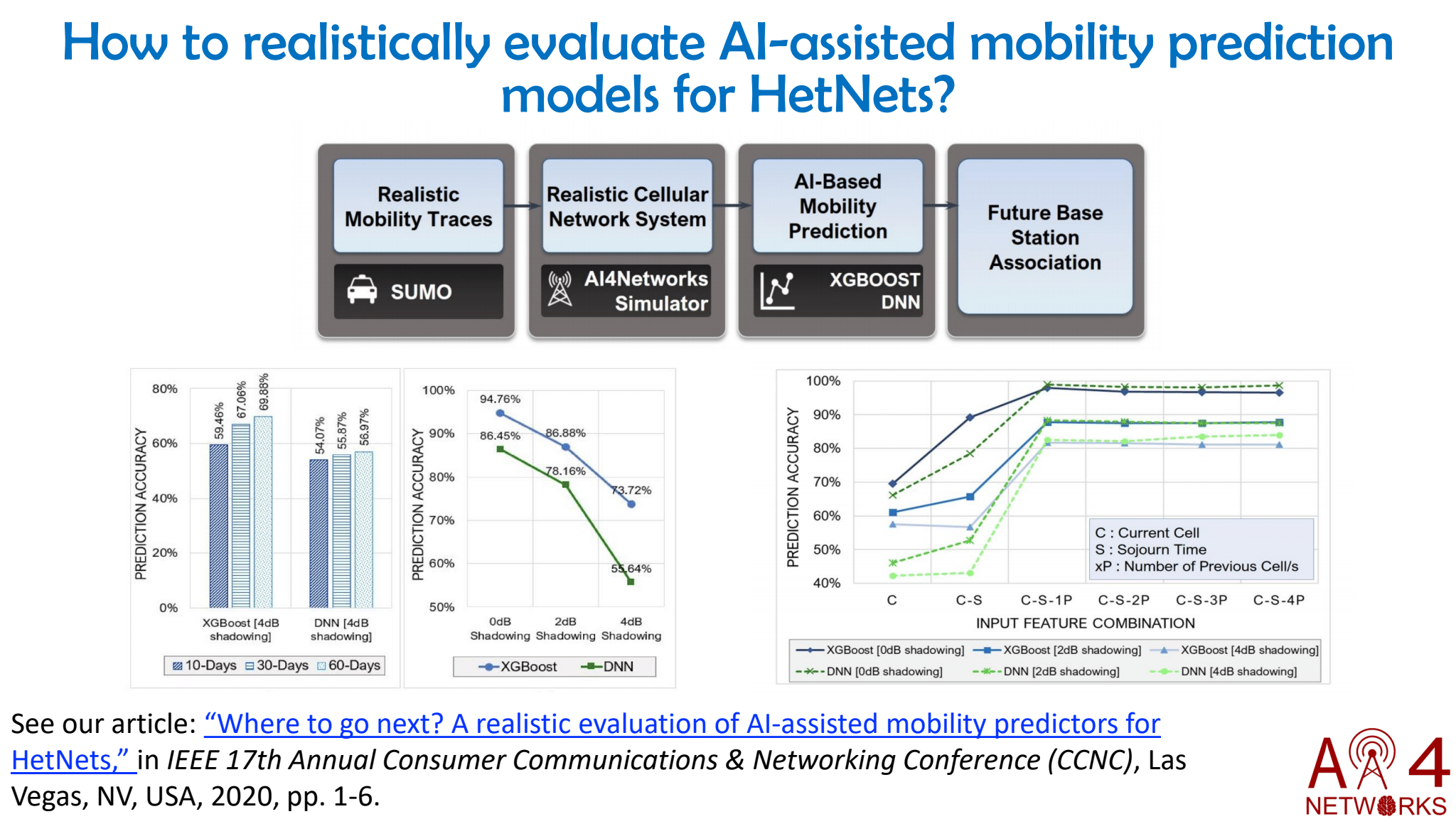Designing an Advanced Mobility Management and Utilization Framework for Enabling mmWave Multi-Band Ultra-Dense Cellular Networks of Future
Title: Designing an Advanced Mobility Management and Utilization Framework for Enabling mmWave Multi-Band Ultra-Dense Cellular Networks of Future.
Funding: This project is funded by the National Science Foundation of USA, under Award No. 1718956.
Duration: Three years (October 1, 2017, to September 30, 2020)
Funding Amount: $ 500,000.00
The problem addressed by the project
Providing connectivity on the go i.e., supporting mobile users is the key reason the mobile cellular networks exist. To support user mobility cellular networks are required to have the capability for seamlessly executing handovers from one cell to another cell. Each handover incurs a certain cost for the network as well as the users. The most significant of these costs include:
- Signalling overhead
- Throughput loss due to low SINR before and during the handover
- Latency
- UE battery drainage in cell discovery and measurements, and
- Risk of call drop due to handover failure
As the number of handovers increases in a network, all of these costs increase. The number of handovers in a given network compound mainly with the following three factors:
- Shrinking cell sizes.
- Increase in the number of mobile users compared to static users.
- Increase in the average speed of the users e.g. due to highly mobile devices needing connectivity such as those manifested by autonomous cars, bullet trains and UAVs etc.
As all of the above three factors are on the rise, the costs associated with handovers are expected to increase substantially in emerging networks. Maintaining resource efficiency and quality of experience expected from emerging networks vis-a-vis 5G and beyond is a challenge and requires a rethinking of the current handover process in cellular networks.
Another factor that makes current mobility management and handover protocols inadequate for emerging networks is the advent of mmWave cells. Low-frequency bands allow graceful overlap among cells to provide enough time margin for Handover to be conducted. In contrast, mmWave cell coverage may end abruptly, giving little to no time for executing handover.
These challenges together require a paradigm shift in mobility management in emerging and future cellular networks i.e. 5G and 6G.
Project Goals
The overarching goal of this project is to design, develop and evaluate an Advanced Mobility Management Framework for emerging and future cellular networks. This framework is aimed to act as a key enabler for seamless, resource-efficient and Quality of Experience aware mobility management in emerging ultra-dense multi-band networks. The framework is also aimed to act as a key enabler for Ultra Reliable Low Latency Connectivity (URLLC), particularly for use cases that involve mobility such as autonomous cars, UAVs, health-care applications on the go and bullet trains etc. The main idea in the proposed project is to develop a machine learning-based framework to transform mobility management from being a reactive process to a proactive process. To realize this framework project has the following three interlinked goals:
- The first goal in this project is to develop robust machine learning-based models to predict certain attributes of user mobility in cellular networks. These attributes include but are not limited to candidate cell and frequencies for next handover and future traffic hotspots and cell loads.
- The second goal is to exploit these machines learning-based mobility and load prediction models for developing novel algorithms, protocols and solutions for proactive mobility robust optimization (P-MRO) and proactive mobility load balancing (P-MLB). This goal also includes using these prediction models to develop other proactive SON functions such as proactive energy efficiency SON.
- The third goal is to validate the accuracy limits of the machine learning-based prediction models. This goal also includes the analysis of the performance bounds of the proactive SON solution that leverage these models.

Active Members
PI: Dr. Ali Imran (Principal Investigator)
Co-PI: Dr. Hazem Refai
GRA: Asad Zaidi (Ph.D. student)
GRA: Marvin Manalastas (Masters graduate/Ph.D. student)
GRA: Waseem Raza (Ph.D. student)
Fulbright Ph.D. Scholar: Aneeqa Ijaz (Ph.D. student)
Fulbright Ph.D. Scholar: Muhammad Umar Bin Farooq (Ph.D. student)
Past Members
Post Doctoral Fellow: Dr. Hasan Farooq
GRA: Hasan Farooq (Ph.D. graduate)
GRA: Azar Taufique (Ph.D. graduate)
Academic Collaborators
Prof. Muhmmad Imran, Rural 5G Hub, University of Glasgow, UK.
Prof. Rahim Tafazolli, 5GIC, University of Surrey, UK.
Industry Collaborators
US Cellular
AT&T
Fujitsu
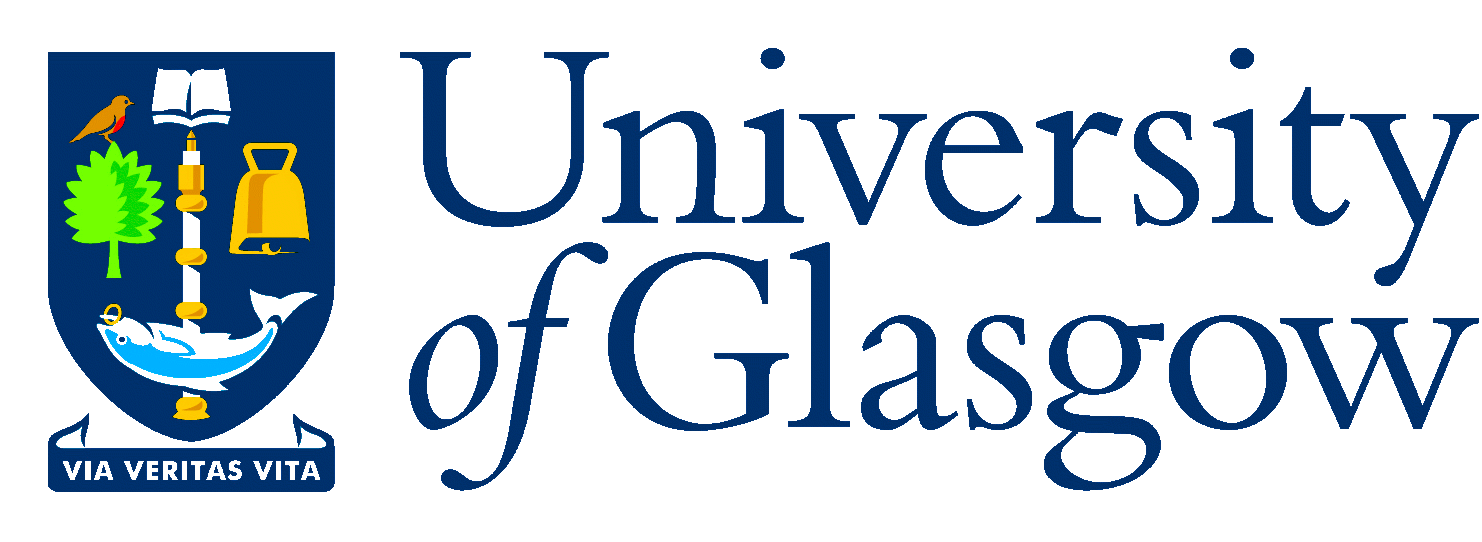

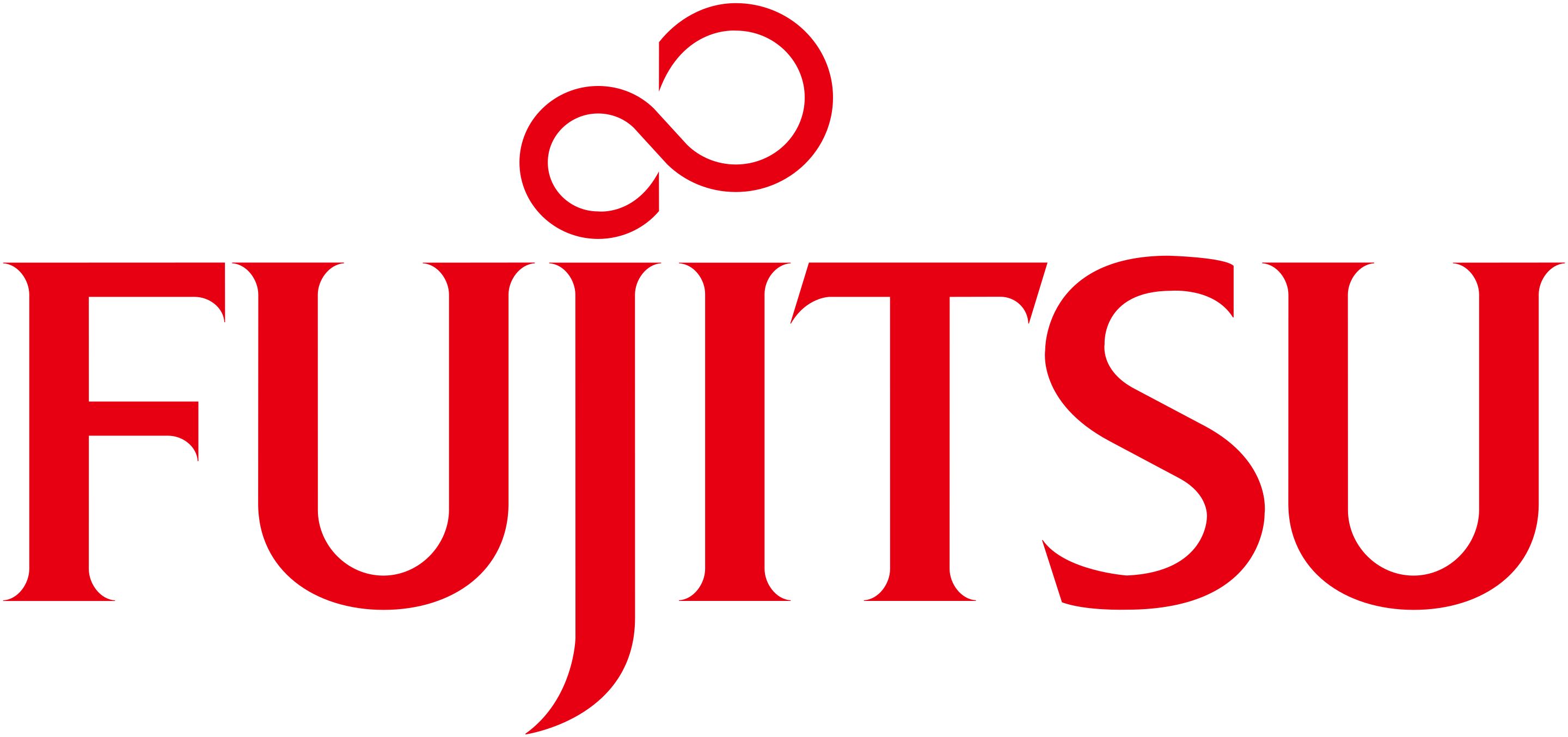


Integration of project outcomes into teaching
The project outcomes are being adapted into following two courses being taught by PI.
- "Emerging Topics in 5G and Beyond" Offered in Sring 2018, 2019 and 2020.
- "Telecommunication Technologies" Offered in Fall 2017, 2018, 2019.
K-12 Outreach Program
- PI is running a K-12 outreach program with Booker T. Washington high school, Tulsa. The majority of students in this school belong to underrepresented communities in STEM.
- Through this program several high school students have participated in research being carried out as part of this project and other NSF funded projects. For the details of this K-12 outreach program and how to participate see:
Internship opportunities for K-12
Tutorials
- Ali Imran, Muhammad Ali Imran, Moving Towards Zero-Touch Automation, A Key Enabler for 6G: The Challenges & Opportunities a half day tutorial at IEEE Wireless Communications and Networking Conference, May 25-28, 2020.
- Ali Imran, Muhammad Ali Imran, "LEAP for IoT- LEAN, Elastic, Agile and Proactive (LEAP) Wireless Networks for Enabling IoT", a half day tutorial at 2017 IEEE PIMRC, Montreal, 8-13 Oct 2017.
- Ali Imran, "Can mmWave, massive MIMO and densification suffice to meet capacity and QoS requirements in emerging IoT?", half day seminar at International Conference on Communications Technologies (ComTech-2017), Pakistan, 19-21 October, 2017.
- Ali Imran "CDSA and BSON: The Two Key Enablers of Lean, Elastic and Proactive Wireless Networks Needed for Future IoT", a half day tutorial to be delivered at 2016 IEEE 3rd World Forum on Internet of Things, Washington DC, 6-8 Dec, 2017.
Keynotes/Invited Talks
- Ali Imran "Leveraging AI for Zero-Touch Automation in 6G: How to Address the Training Data Sparsity/Scarcity Challenge?" keynote at IEEE 2nd International workshop on Data Driven Intelligence for Networks and Systems workshop at Infocom 2020, July 6-9, Toronto, Canada.
- Ali Imran "Towards Zero Touch Automation in Emerging Wireless Networks", keynote at 13th IEEE International Conference on Open Source System and Technologies 17-19 Dec, 2019.
- Ali Imran "Addressing the Hyper Parameterization Challenge in AI for Wireless Networks", panel talk at, IEEE Globecom, Dec, 9-13-2019
- Ali Imran "What AI Can Deliver for 5G and Beyond", keynote at 5G NA, May 8th-9th , 2019, Denver, USA
- Ali Imran "Role of AI in Emerging Networks: 5G and Beyond", keynote at 12th IEEE International Conference on Open Source Systems and Technologies, 19-21, Dec, 2018 (IEEE ICOSST 2018), Lahore, Pakistan.
- Ali Imran "AI for RAN automation: do's and don'ts for industry", plenary talk at RAN USA, Dec 3, 2018, Silicon Valley.
- Ali Imran "Challenges in Use of AI for Network Automation and How to Address These Challenges", invited talk at Fujitsu Laboratories, Europe, July 11, 2018, London, UK.
- Ali Imran "Leap Towards Zero Touch RAN Automation", invited talk, at Telekom Austria HQ, Jun 25, 2018, Vienna, Austria
- Ali Imran "How AI Will Transform the Future of RAN", invited talk at AT&T Campus, Silicon Valley , April 17, 2018, San Romano, CA, USA.
- Ali Imran "Future of Open Source Software Defined Big Data Enabled RAN", keynote at 11th international conference on open source system and technologies, Dec 18-20, 2017, Lahore, Pakistan.
- Ali Imran "Next Generation Artificial Intelligence Based RAN", invited talk in an industry panel at RAN USA, Dec 4, 2017, Silicon Valley, USA.
International Collaboration Opportunities
- Project students gained international collaboration experience by working with collaborators at:
- 5GIC, Surrey, UK.
- The University of Glasgow. UK.
- The University of Leads, UK.
Conference Attendance by Students
- Project students have attended and presented their work at following conferences
- IEEE 17th Annual Consumer Communications and Networking Conference (CCNC), Las Vegas, NV, Jan 2020.
- IEEE ICC, Kansas, USA, 20-24 May, 2018.
Industry Internships
- Project students have interned with the following industry collaborators:
- New T-Mobile, CT in Spring 2020.
- Sprint, CT in Fall 2019.
- MobileComm, Dallas in Summer 2019.
- Bell Labs, NJ in Summer 2018.
- Phazr, Dallas in Fall 2017.
-
Patents
- A. Imran, H. Farooq, and A. Asghar, "Methods And Apparatus For Proactive Self-Optimization Using Data About Network User Behaviour, Mobility And Measurements," , PCT/US19/35816, 2019.
-
Book Chapters
- F. Ahmed, M. Z. Asghar, and Ali Imran, "Combinatorial Optimization for Artificial Intelligence Enabled Mobile Network Automation," a book chapter in book titled "Metaheuristics in Machine Learning: Theory and Applications" , pp. 663-690, October 2021 .
- A. Taufique, A. Rizwan, A. Imran, K. Arshad, A. Zoha, Q. H. Abbasi, and M. A. Imran, "Big data analytics for 5G networks: utilities, frameworks, challenges and opportunities," In: Tafazolli, R., Wang, C.-L. and Chatzimisios, P. (eds.) Wiley 5G REF: the Essential 5G Reference Online. John Wiley & Sons Ltd. ISBN 9781119471509 , 2021.
-
Journal Articles
- A. Zaidi, H. Farooq, A. Rizwan, A. Abu-Dayya, and A. Imran, "A Framework to Address Mobility Management Challenges in Emerging Networks," IEEE Wireless Communications, November 2022, doi: 10.1109/MWC.015.2100666.
- S. M. A. Zaidi, M. Manalastas, M. U. B. Farooq, H. Qureshi, A. Abu-Dayya, and A. Imran, "A Data Driven Framework for QoE-Aware Intelligent EN-DC Activation," IEEE Transactions on Vehicular Technology, pp. 1-14, October 2022, doi: 10.1109/TVT.2022.3211741.
- M. Manalastas, M. U. B. Farooq, S. M. A. Zaidi, A. Abu-Dayya, and A. Imran, "A Data Driven Framework for Inter-Frequency Handover Failure Prediction and Mitigation," IEEE Transactions on Vehicular Technology, pp. 1-1, March 2022, doi: 10.1109/TVT.2022.3157802.
- M. U. B. Farooq, M. Manalastas, W. Raza, A. Rizwan, S. M. A. Zaidi, M. Manalastas, A. Abu-Dayya, and A. Imran, "A Data-Driven Self-Optimization Solution for Inter-Frequency Mobility Parameters in Emerging Networks," IEEE Transactions on Cognitive Communications and Networking, February 2022, doi: 10.1109/TCCN.2022.3152510.
- S. Manzoor, S. Mazhar, A. Asghar, A. N. Mian, A. Imran, and J. Crowcroft, "Leveraging mobility and content caching for proactive load balancing in heterogeneous cellular networks," Transactions on Emerging Telecommunications Technologies, vol. 31, no. 2, September 2020, doi: 10.1002/ett.3739.
- S. M. A. Zaidi, M. Manalastas, H. Farooq, and A. Imran, "Mobility Management in Emerging Ultra-Dense Cellular Networks: A Survey, Outlook, and Future Research Directions," IEEE Access, vol. 8, pp. 183505-183533, August 2020, doi: 10.1109/ACCESS.2020.3027258.
- U. S. Hashmi, S. A. R. Zaidi, A. Imran, and A. Abu-Dayya, "Enhancing Downlink QoS and Energy Efficiency through a User-Centric Stienen Cell Architecture for mmWave Networks," IEEE Transactions on Green Communications and Networking, vol. 4, no. 2, pp. 387-403, June 2020, doi: 10.1109/TGCN.2020.2967888.
- S. M. A. Zaidi, M. Manalastas, H. Farooq, and Ali Imran, "SyntheticNET: A 3GPP Compliant Simulator for AI Enabled 5G and Beyond," IEEE Access, vol. 8, pp. 82938-82950, May 2020, doi: 10.1109/ACCESS.2020.2991959.
- H. Farooq, A. Asghar, and A. Imran, "Mobility Prediction Based Proactive Dynamic Network Orchestration for Load Balancing With QoS Constraint (OPERA)," IEEE TRANSACTIONS ON VEHICULAR TECHNOLOGY, vol. 69, no. 3, pp. 3370-3383, March 2020, doi: 10.1109/TVT.2020.2966725.
- A. Taufique, A. Mohamed, H. Farooq, A. Imran, and R. Tafazolli, "Analytical Modeling for Mobility Signalling in Ultradense HetNets," IEEE Transactions on Vehicular Technology, vol. 68, no. 3, pp. 2709-2723, March 2019, doi: 10.1109/TVT.2018.2864627.
- H. Farooq, A. Asghar, and A. Imran, "Mobility Prediction-Based Autonomous Proactive Energy Saving (AURORA) Framework for Emerging Ultra-Dense Networks," IEEE Transactions on Green Communications and Networking, vol. 2, no. 4, pp. 958-971, December 2018, doi: 10.1109/TGCN.2018.2858011. This solution won first prize in IEEE Green ICT International competition for Best Solution, held in Paris, 2017. The competing teams included participants from over 30 countries.
- O. Onireti, A. Imran, M. A. Imran, and R. Tafazolli, "Coverage, capacity, and energy efficiency analysis in the uplink of mmWave cellular networks," IEEE Transactions on Vehicular Technology, vol. 67, no. 5, pp. 3982-3997, May 2018, doi: 10.1109/TVT.2017.2775520.
-
Submitted Journal Papers
- M.U. B. Farooq, S.M.A. Zaidi, A. Taufique, A. Rizwan, A. Abu-Dayya, A. Imran, “Towards Deriving Analytical Model for Optimal Cell Overlap to Reduce Handover Signaling”, submitted to IEEE Transactions on Vehicular Technology Correspondence, 2021
- S.M.A. Zaidi, M. Manalastas, H.N. Qureshi, A. Rizwan, A. Abu-Dayya, and A. Imran, “AI-Assisted Joint Search Approach for mmWave Cell Discovery Using Sparse MDT Data”, submitted to IEEE Transactions on Vehicular Technology, 2021
- M. Manalastas, M.U.B. Farooq, S.M.A. Zaidi, H.N. Qureshi, U. Masood, A. Abu-Dayya, and A. Imran, “Towards Zero-Touch Optimization in Emerging Cellular Networks: A Framework to Address Key Challenges in Leveraging AI”, submitted to IEEE Network, 2021
- H. Farooq, S.M.A. Zaidi, A. Rizwan, A. Abu-Dayya, and A. Imran, “A Framework to Address Mobility Management Challenges in Emerging Networks”, IEEE Wireless Communications, 2021
- S.M.A. Zaidi, M. Manalastas, M.U.B. Farooq, H.N. Qureshi, A. Abu-Dayya, and A. Imran, “A data driven framework for QoE-Aware Intelligent EN-DC Activation”, submitted to IEEE Transactions on Vehicular Technology, July 2021
- M. H. Naveed, U. S. Hashmi, N. Tajved, N. Sultan, and A. Imran, “Performance Analysis of Synthetic Data Generation Techniques for Network Activity Forecasting” submitted to IEEE ACCESS
-
Peer Reviewed Conference Papers
- M.U.B. Farooq, M. Manalastas, S.M.A. Zaidi, A. Abu-Dayya, and A. Imran, "Machine Learning Aided Holistic Handover Optimization for Emerging Networks," IEEE International Conference on Communications (ICC), pp. 710-715, IEEE, May 2022, doi: 10.1109/ICC45855.2022.9839024.
- M. Nabeel, M. Manalastas, A. Ijaz, H. Refai, and A. Imran, "Investigating Handover Behavior with 5G and Beyond TurboRAN Testbed," Seventh International Conference On Mobile And Secure Services (MobiSecServ), pp. 1-6, February 2022, doi: 10.1109/MobiSecServ50855.2022.9727204.
- M. U. B. Farooq, M. Manalastas, W. Raza, A. Ijaz, S.M.A. Zaidi, A. Abu-Dayya, and A. Imran, " Data Driven Optimization of Inter-Frequency Mobility Parameters for Emerging Multi-band Networks," IEEE Global Communications Conference (GLOBECOM), pp. 1-6, IEEE, December 2020, doi: 10.1109/GLOBECOM42002.2020.9348101.
- S. M. A. Zaidi, M. Manalastas, A. Abu-Dayya, and A. Imran, "AI-Assisted RLF Avoidance for Smart EN-DC Activation," IEEE Global Communications Conference (GLOBECOM), pp. 1-6, IEEE, December 2020, doi: 10.1109/GLOBECOM42002.2020.9322339.
- M. U. B. Farooq, J. Qadir, M. M. Butt, M. Naeem, and A. Imran, "Utilizing Loss Tolerance and Bandwidth Expansion for Energy Efficient User Association in HetNets," IEEE International Symposium on Personal, Indoor and Mobile Radio Communications (PIMRC), IEEE, August 2020.
- J. Shodamola, U. Masood, M. Manalastas, and A. Imran, " A Machine Learning based Framework for KPI Maximization in Emerging Networks using Mobility Parameters," BlackSeaCom, IEEE, May 2020.
- M. Manalastas, H. Farooq, S. A. Zaidi, and A. Imran, "Where to Go Next? : A Realistic Evaluation of AI-Assisted Mobility Predictors for HetNets," IEEE 17th Annual Consumer Communications & Networking Conference (CCNC), pp. 1-6, IEEE, Jan, 2020, doi: 10.1109/CCNC46108.2020.9045127.
- H. Farooq, A. Imran, and M. Jaber, "AI empowered Smart User Association in LTE Relays HetNets," IEEE International Conference on Communications Workshops (ICC Workshops), pp. 1-6, IEEE, August 2019, doi: 10.1109/ICCW.2019.8756942.
- H. Gebre, H. Farooq, and A. Imran, "What machine learning predictor performs best for mobility prediction in cellular networks?," IEEE International Conference on Communications Workshops (ICC Workshops), pp. 1-6, IEEE, August 2019.
- M. N. Rafiq, H. Farooq, A. Zoha, and A. Imran, "Can temperature be used as a predictor of data traffic? A real network big data analysis," IEEE/ACM 5th International Conference on Big Data Computing Applications and Technologies (BDCAT), pp. 167-173, IEEE, December 2018.
- H. Farooq, A. Asghar, and A. Imran, "Mobility Prediction Empowered Proactive Energy Saving Framework for 5G Ultra-Dense HetNets," IEEE Global Communications Conference (GLOBECOM), pp. 1-7, IEEE, December 2018.
- U. Farooq, U. S. Hashmi, J. Qadir, A. Imran, and A. N. Mian, "User Transmit Power Minimization through Uplink Resource Allocation and User Association in HetNets," IEEE Global Communications Conference (GLOBECOM), pp. 1-6, IEEE, December 2018, doi: 10.1109/GLOCOM.2018.8647409.
- H. N. Qureshi, and A. Imran, "Towards Designing Systems with Large Number of Antennas for Range Extension in Ground-to-Air Communications," IEEE International Symposium on Personal, Indoor and Mobile Radio Communications (PIMRC), pp. 1-5, IEEE, September 2018.
- U. Hashmi, A. Islam, K. M. Nasr, and A. Imran, "Towards User QoE-Centric Elastic Cellular Networks: A Game Theoretic Framework for Optimizing Throughput and Energy Efficiency," IEEE International Symposium on Personal, Indoor and Mobile Radio Communications (PIMRC), pp. 1-7, IEEE, September 2018.
-
Submitted Conference Papers
- S.M.A. Zaidi, A. Rizwan, A. Abu-Dayya, and A. Imran, “An Analytical Model to Quantify the Effect of Handover and Cell Density on SINR in Emerging Cellular Networks”, submitted to the IEEE 18th International Conference on Wireless and Mobile Computing, Networking and Communications, Oct 2022
- M. Manalastas, M.U.B. Farooq, S.M.A. Zaidi, A. Ijaz, W. Raza, A. Abu-Dayya, and A. Imran, “Machine Learning-Based Handover Failure Prediction Model for Handover Success Rate Improvement in 5G”, submitted to the IEEE 18th International Conference on Wireless and Mobile Computing, Networking and Communications, Oct 2022
- M.U.B. Farooq, M. Manalastas, H. Qureshi, Y. Liu, A. Imran and M.O. Al Kalaa “MDT-based Intelligent Route Selection for 5G-Enabled Connected Ambulances” submitted to IEEE Globecom 2022
-
Theses/Dissertations (3 Ph.D, 3 MS)
- M.U.B. Farooq, “Data Driven Optimization of Inter-Frequency Mobility Parameters for Emerging Networks”, MS Thesis, 2021
- J. Shodomale, “INVESTIGATING THE POTENTIAL OF SYNTHETIC DATA FOR ENABLING AI-BASED ZERO-TOUCH NETWORK AUTOMATION”, MS Thesis, Summer 2021
- M. Manalastas, “Realistic Modeling of Handover Events in A Multi-Carrier 5G Network: A Preliminary Step Towards COP-KPI Relationship Realization”, MS Thesis, 2020
- S.M.A. Zaidi, “Mobility Management in Multi-RAT Multi-Band Heterogeneous Networks”, PhD Dissertation, 2021
- H. Farooq, “A Paradigm Shifting Approach in SON For Future Cellular Networks”, PhD Dissertation, 2018, Winner of Dissertation Excellence Award
- A. Taufique, “On Analytical Modeling of Mobility Signalling in Ultra Dense HetNet”, PhD Dissertation, 2018
-
Prior Work
- A. Mohamed, O. Onireti, M. A. Imran, A. Imran, and R. Tafazolli, "Predictive and Core-Network Efficient RRC Signalling for Active State Handover in RANs With Control/Data Separation," IEEE Transactions on Wireless Communications, IEEE Transactions on Wireless Communications, vol. 16, no. 3, pp. 1423-1436, IEEE Transactions On Wireless Communications, March 2017.
- H. Farooq, and A. Imran, "Spatiotemporal mobility prediction in proactive self-organizing cellular networks," IEEE Communications Letters, IEEE Communications Letters, vol. 21, no. 2, pp. 370-373, IEEE, February 2017.
- O. Onireti, A. Imran, M. A. Imran, and R. Tafazolli, "Energy efficient inter-frequency small cell discovery in heterogeneous networks," IEEE Transactions on Vehicular Technology, IEEE Transactions on Vehicular Technology, vol. 65, no. 9, pp. 7122-7135, IEEE, September 2016.
- A. Mohamed, O. Onireti, S.A. Hoseinitabatabaei, M. A. Imran, A. Imran, and R. Tafazolli, "Mobility prediction for handover management in cellular networks with control/data separation," IEEE International Conference on Communications (ICC), IEEE International Conference on Communications (ICC), pp. 3939-3944, IEEE, June 2015.
- O. Onireti, A. Imran, M. A. Imran, and R. Tafazolli, "On Energy Efficient Inter-Frequency Small Cell Discovery in Heterogeneous Networks," IEEE International Conference on Communications (ICC), IEEE International Conference on Communications (ICC), pp. 13-18, IEEE, June 2015.
